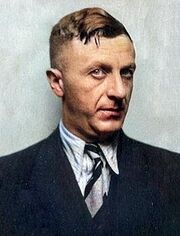
Sergey Taboritsky in 1937.
Sergey Vladimirovich Taboritsky (12 August 1897– 16 October 1980) was a Russian ultranationalist and monarchist. From 1936 to 1945, he was the deputy of the Bureau for the Russian Refugees in Germany. After 1942, Taboritsky became a member of the Nazi Party, and directly collaborated with the Gestapo.
Biography[]
Sergey and his younger brother, Nikolay Taborissky (the spelling of his name at the beginning of the twentieth century was inconsistent; during the emigration years, the "Taboritsky" variant was used) were the illegitimate children of baptized Jewish tailor and owner of a fashion shop Anna Vladimirovna and her cohabitant, Sergey Alexandrovich Zapevalov (who broke up with her in 1901). Both brothers were raised as Orthodox Christians. The brothers had the surname of Anna Vladimirovna's first husband, also Jewish, Wulf Aizikovich Taborissky, a tradesman from Ashmyany, who had left the country long before both of them were born, in 1887. According to the documents, they were regarded as the children of Wulf Taborissky, since the first divorce of their mother occurred only in 1899.
He graduated from the Realschule of Gurevich in 1915. There were later stories that Taboritsky was participating in World War I fighting under the command of Grand Duke Michael Alexandrovich as part of the Caucasian Native Cavalry Division, but can't be considered as reliable, as documented information on his activities in 1915-1919 has not been found. According to some reports, he was an assistant to the commissioner from the State Duma and deputy Georgy Deryugin during this time.
After the February Revolution, he was in Ukraine, where he left for Germany. In Kyiv, in a Petlyurite prison, he became acquainted with the monarchist Pyotr Shabelsky-Bork, with whom he then constantly communicated with while he was in exile.
At first, Taboritsky lived in Berlin, then in Mecklenburg and from January to March 1922 in Munich. While in Berlin, he was co-editor of the antisemitic magazine Luch Sveta ("Ray of Light"), which was published from April 1919 onward. Before the assassination attempt on Paul Milyukov, he worked as a typewriter. For ideological reasons, he refused to take commissions from the Soviet Union.
In 1921, accidentally meeting former State Duma politician Alexander Guchkov on a street in Berlin, Taboritsky attacked him and beat him with an umbrella, for which he spent several days in a local prison.
Together with Shabelsky-Bork, Taboritsky participated in the preparation of the assassination attempt against Pavel Milyukov. To accomplish that, they drove from Munich to Berlin. During the lecture of Milyukov, Taboritsky opened fire. When Vladimir Dmitrievich Nabokov rushed at Shabelsky, striking him in the arm in which he was holding a revolver, Taboritsky shot three times at point-blank range at Nabokov. Nabokov was immediately killed by a shot in the heart.
The trial of the assassination attempt against Milyukov took place on July 3–7, 1922, in the Berlin Criminal Court in Moabit. The court sentenced Taboritsky to 14 years of hard labor for complicity in the attempt and intentionally inflicting serious wounds on Nabokov that caused his death, though in the spring of 1927 he was released under an amnesty.
Since May 1936 Taboritsky was the deputy of General Vasily Biskupsky for the Nazi-created Bureau for Russian Refugees in Germany (Vertrauensstelle für russische Flüchtlinge in Deutschland). Taboritsky's duties included maintaining a file cabinet of Russian emigration and political monitoring of its sentiments. After the outbreak of war with the USSR, he headed the recruitment of translators for the Wehrmacht among Russian emigrants. Taboritsky's activities were carried out in close contact with the Gestapo.
In the last days of the war, Taboritsky fled from Berlin, later living in Limburg an der Lahn. He continued to occasionally publish in the Brazilian monarchist journal Vladimirsky Vestnik. Taboritsky died on 16 October 1980.
